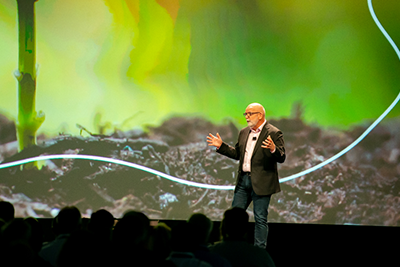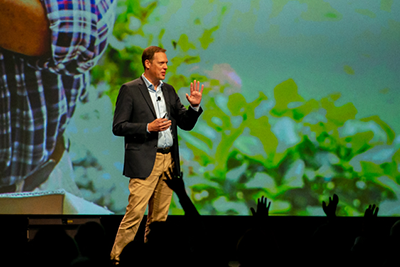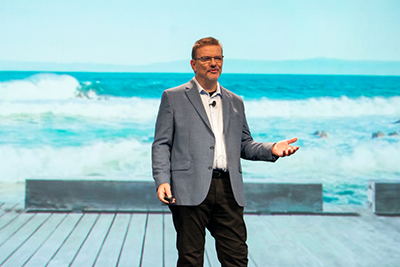Sustainability Is The Challenge Of Our Time For Global Commerce
- 15 June 2022
The increase in global commerce over the last century is certainly a positive development, however, it has also brought challenges of its own. Operational & fiscal matters aside for one moment, the urgency of the climate change situation has thrust ethical & environmentally related questions to the forefront of both the corporate & social agendas.
With almost every brand taking steps to become more sustainable, Manhattan’s Momentum 2022 customer conference tackled a number of these pressing questions head on: from environmentally responsible initiatives, to the practical elements of making global commerce (& the supply chains that fuel it) more sustainable.
Manhattan CEO, Eddie Capel had already advocated the potential ‘green gains’ supply chains can be a part of in November as COP26 took place in Glasgow. 
However, the annual Momentum event in Miami presented another opportunity for him to underline Manhattan’s commitment to the planet.
During his keynote on day one of the conference he announced an initiative with reforestation organization, One Tree Planted, to plant a tree for each Momentum attendee, further building on the Earth Day pledge made to Manhattan employees that the company would plant a tree for each of its 3,700+ associates too.
Senior vice president of product management, Brian Kinsella, addressed sustainability from a product perspective highlighting Manhattan’s unique ability to extend greener consumer choices to eliminate unnecessary returns, wasted packaging & shipping, by allowing them to change an order right up until the moment an item is loaded for delivery.
He also highlighted recent advancements in warehouse & transportation management that reduce carbon footprints by drawing on emerging technologies like machine learning & in-memory computing to create faster, smarter & more efficient logistic plans.
“Through its innovative work unifying omnichannel commerce, distribution & transportation solutions, Manhattan is able to extend the customer remorse period far beyond traditional, monolithic solutions. By changing these orders before the truck doors are sealed, Manhattan’s customers can eliminate excessive delivery miles & reduce the carbon emissions & waste associated with traditional returns processes.
“Our goal is to reduce returns by giving customers full control of their orders until the last moment before it’s put in a van,” Kinsella added.
Dr. Frank Appel, CEO of DHL Group is a well-known & keen advocate for building sustainability into logistics processes commenting in a previous blog post: “There is no way around sustainable logistics in the future. We are deciding today what kind of world we & our children will live in 30 years from now. And our aspiration is to make a substantial contribution to ensure that this will be an even better world.”
The keynote from Dr. Markus Voss, CIO & COO of supply chain at DHL Group echoed Appel’s comments, highlighting the carbon cost of logistics & the need for collaboration to solve the climate crisis through the digitalization of supply chains, the use of new green tech & the proliferation of sustainable energy sources.
“We will be carbon neutral in all our warehouses by 2025 & I am forecasting that I will have to double the size of my IT organization by 2030 as we aim to achieve our goal of a fully digitized supply chain.
“Logistics is responsible for 25% of carbon emissions, so investing in sustainable fuels & electric planes is as much of a must today, as shipping ‘air’ is a crime. We need partners that are committed to the same sustainable, digital journey we are on, just like Manhattan,” Voss finished.
DHL is aggressively pursuing sustainable targets & has committed to a zero-emissions target by 2050. It is investing in sustainable aviation fuels as part of an important step in its decarbonization journey; both in terms of its clean operations commitment, but also in reducing the emissions footprint of transported goods for its customers.
The logistics giant has also committed to electrifying 60% of its last mile delivery vehicles by 2030 & supports the development & market availability of hydrogen & electric trucks.
Gen Z retailer PacSun followed the sustainable theme with Co-CEO Michael Relich.
There are 36 billion clothing items thrown away each year in the US alone, 95% of which could be reused or recycled. Thanks to PacSun’s commitment to sustainability & its collaborative partnership with ThredUp, consumers can ‘Rewear. Recirculate. Repeat.’ PacSun goods.
“When you trade in a pair of old PacSun jeans we’ll give you discount towards a new pair. By giving clothing a second life it reduces the environmental impact by as much as 82% & by returning one clothing item back into the circular economy extends its life by an average of 2.2 years.
“Extending the life of clothes helps fight fashion waste & shopping secondhand displaces the need for new clothing production, diverting items from landfill,” Relich added.
Climate change & sustainability are topics that should concern everyone, from the largest international organisations & governments, right down to us on an individual level.
Often the weight of these matters can feel like a crushing inevitability, however, we must remain positive & hopeful that with the type of collaborative actions & initiatives on show at Momentum, we can (individuals & brands alike), build a more environmentally conscious, sustainable future for those generations to follow.
For more information on Manhattan’s commitment to sustainability visit our ESG page here


